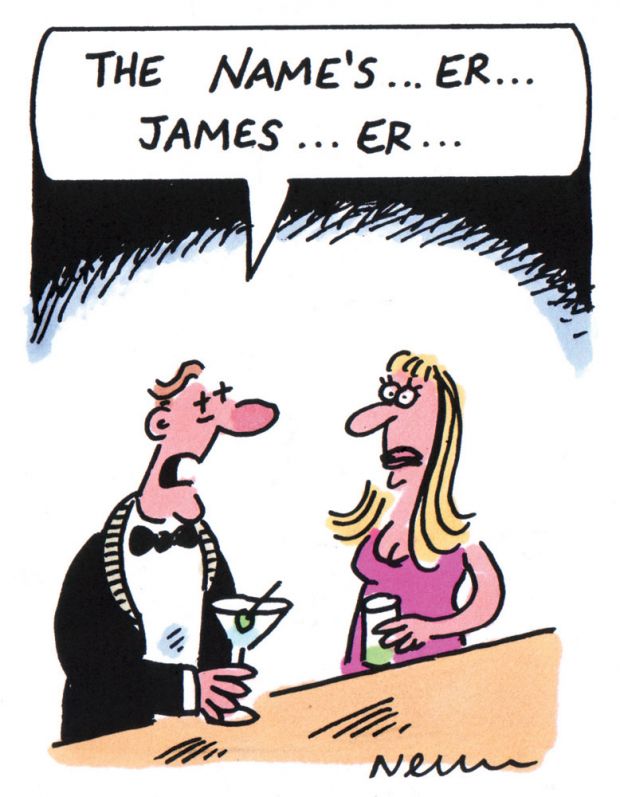
- As Christmas nears, the papers soak up booze-related stories like sponges. On 13 December, The Daily Telegraph reported a claim in a British Medical Journal paper that James Bond’s martini intake – 92 units a week – would, in real life, have made him useless in a car chase or as a seducer and would have killed him off by his mid-fifties – an age at which Sir Roger Moore was still strutting his stuff in the role. A day later, The Times reported a Finnish study in the Journal of Epidemiology and Community Health suggesting that intelligent people are more likely to be boozers. This is because “peer influences and the tendency to seek novel experiences could link better verbal development with drinking behaviours”. (The meaning of that sentence will no doubt become clear after a few glasses of eggnog.)
- Since ancient times philosophers have furrowed their brows over the so-called liar paradox. Simply put, if someone tells you they are a habitual liar, can you believe them? If they are telling the truth then, as habitual liars, they must be lying. But if they are lying about being a liar then they must be telling the truth. (Yes, our heads hurt, too.) However, The Daily Telegraph reported on 14 December that University of Amsterdam scientists have taken a sword to that thorny logical thicket by sitting volunteers in a booth with a die and a wad of cash. They found liars to be typically honest about being fibbers, and suggest that their cheerful admissions might be caused by the higher prevalence among them of “psychopathic” traits, such as a lack of remorse. Or maybe not. As everything in this column is a lie we may never be sure.
- Universities UK chief executive Nicola Dandridge will not be feeling festive after being castigated for the organisation’s guidance on gender-segregated events. A controversial case study in the guidance, which suggested segregation could be permitted if it was voluntary, was withdrawn last week after being criticised by David Cameron. Independent columnist Yasmin Alibhai-Brown said on 16 December that hearing Ms Dandridge – a qualified lawyer who used to head the Equality Challenge Unit – defend the guidance on Radio 4’s Today programme had made her throw a glass of water at the radio. “The glass broke and I picked up the pieces, almost weeping with rage,” she wrote. “Such white liberals…need to grow up…this Talibanisation of British universities has got to stop.” So, it might be argued, has the neologismisation of English.
- Another senior higher education figure to cop a pasting this week, University of London vice-chancellor Sir Adrian Smith, has come out fighting – though, we hasten to add, not literally. Sir Adrian had been heavily criticised by students and some academics for obtaining an injunction against protests after the occupation of the university’s Senate House headquarters on 4 and 5 December. In an interview with The Independent on 16 December, Sir Adrian said the level of aggression at the occupation, which resulted in 41 arrests, was indicative of a “sea change” in the tone of recent student protests. He said the final straw had been the safety risk caused by the infiltrators’ blockade of the fire escape. The former director-general for knowledge and innovation at the Department for Business, Innovation and Skills also complained of “masked people climbing up to the balcony, trying to get through the windows”. Did he not wonder if they were Santa’s little helpers, trying to deliver an early Christmas present from his old chum David Willetts in the form of an uncapped admissions system?
- Female scientists’ preference for abstract art suggests their approach to research may be more groundbreaking than that of male colleagues, The Daily Telegraph reported on 16 December. University of Reading researchers found that female scientists’ greater ease with the “moody or affective” aspects of abstract art suggests they may have “a more anarchic, creative and radical approach to science”, the article said. Too bad, then, that, according to another Telegraph article on 10 December, their research is significantly underfunded compared with men’s – at least in the area of infectious diseases. The study, published in BMJ Open, found that women received, on average, grants worth 30 per cent less than men. It’s enough to make you want to recreate a Jackson Pollock.
Register to continue
Why register?
- Registration is free and only takes a moment
- Once registered, you can read 3 articles a month
- Sign up for our newsletter
Subscribe
Or subscribe for unlimited access to:
- Unlimited access to news, views, insights & reviews
- Digital editions
- Digital access to THE’s university and college rankings analysis
Already registered or a current subscriber?
Please or to read this article.
